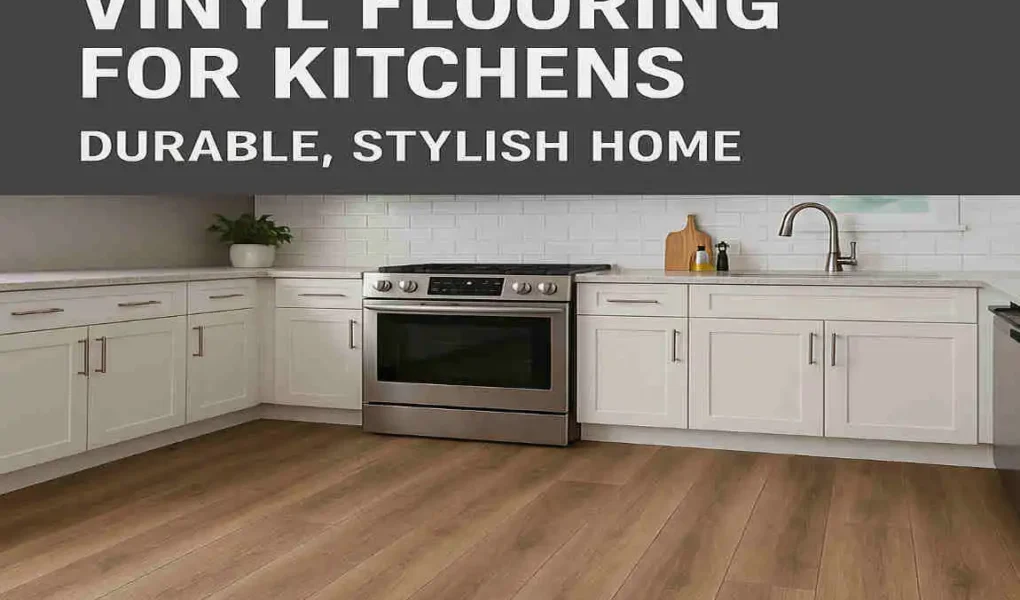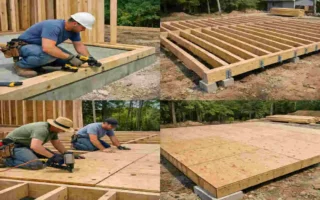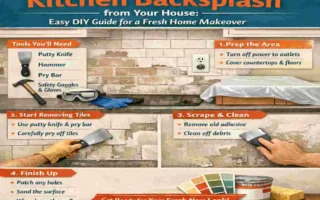Kitchens are the heart of every home, and they deserve flooring that is not only stylish but also practical and durable. For homeowners seeking a flooring option that withstands spills, stains, and heavy foot traffic, waterproof vinyl flooring is a game-changer.
What is Waterproof Vinyl Flooring?
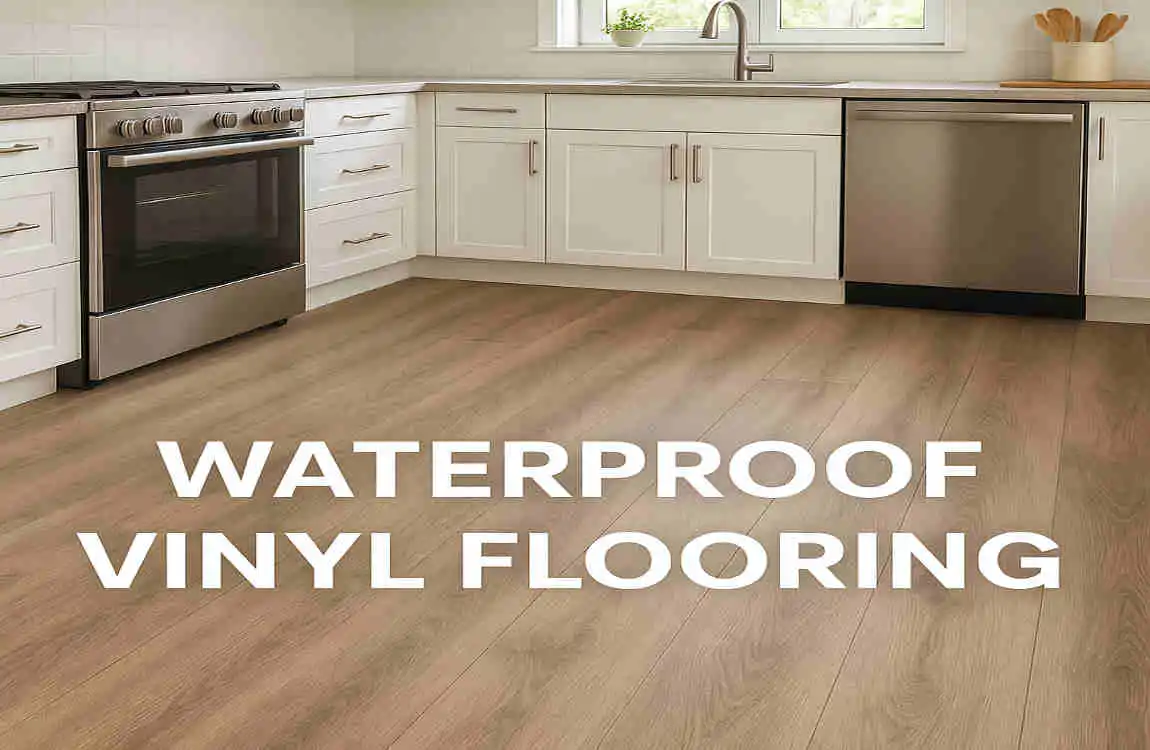
To fully appreciate why waterproof vinyl flooring is ideal for kitchens, it’s essential to understand what it is and how it works.
Definition of Vinyl Flooring
Vinyl flooring is a synthetic material designed to mimic the look of natural materials like wood, stone, or tile. It has gained immense popularity due to its affordability, durability, and ease of maintenance. When equipped with waterproof technology, vinyl flooring becomes even more versatile, especially for moisture-prone areas like kitchens.
Types of Vinyl Flooring for Kitchens
Three main types of vinyl flooring are especially suitable for kitchens:
- Luxury Vinyl Plank (LVP): Resembles hardwood planks and provides a realistic wood-like appearance.
- Luxury Vinyl Tile (LVT): Mimics the look of stone or ceramic tiles, offering a high-end aesthetic.
- Stone Plastic Composite (SPC): A rigid core vinyl flooring option made with a stone-polymer blend, known for its strength and waterproof properties.
How Waterproofing Works
Waterproof vinyl flooring is designed with a multi-layer structure. The core layer is made from waterproof materials such as PVC or SPC, preventing water from seeping through. Additionally, a protective wear layer ensures durability, while the top layer often features a stylish finish that enhances its appearance.
Why Choose Waterproof Vinyl Flooring for Kitchens?
If you’ve ever dealt with water damage or kitchen spills, you’ll understand the importance of choosing the right flooring. Let’s explore why waterproof vinyl flooring is the ultimate choice for kitchens.
Moisture Resistance
Kitchens are prone to spills, leaks, and humidity. Waterproof vinyl flooring prevents water from seeping into the material, preventing warping, swelling, or mold growth.
Durability
Made to withstand heavy foot traffic, waterproof vinyl is highly resistant to scratches, stains, and dents. Whether your kitchen is a hub of activity or a quiet cooking space, this flooring will stand the test of time.
Comfort and Maintenance
Unlike cold tile or hardwood, waterproof vinyl offers a softer feel underfoot, making it comfortable to stand on for long hours. Plus, its smooth surface makes cleaning up spills a breeze – wipe, and you’re done!
Comparison with Other Flooring Options
Here’s a quick comparison of waterproof vinyl flooring with other common kitchen flooring types:
Flooring Type Durability Water Resistance Comfort Maintenance
Waterproof Vinyl High Excellent Comfortable Easy
Ceramic Tile High Excellent Hard Moderate
Hardwood Moderate Low Comfortable High
Laminate Moderate Low to Moderate Comfortable Moderate
Top Features to Look for in the Best Waterproof Vinyl Flooring for Kitchens
When shopping for waterproof vinyl flooring, prioritize features that suit your kitchen’s needs. Here are the most critical ones:
Waterproof Core Technology
The core layer plays a vital role in preventing moisture from entering. Look for options with rigid waterproof cores, such as SPC or WPC (Wood Plastic Composite).
Thickness and Wear Layer
The thickness of your vinyl flooring affects its durability and comfort. A thicker wear layer (ideally 20 mil or higher) ensures better protection against scratches and dents, especially in high-traffic kitchens.
Style and Design
Waterproof vinyl flooring comes in a variety of styles, including wood-look planks, stone-look tiles, and even bold patterns. Choose a design that complements your kitchen’s décor and enhances its overall aesthetic.
Installation Methods
You’ll find various installation methods, such as:
- Click-Lock Systems: Perfect for DIY enthusiasts, these planks snap together easily.
- Glue-Down Options: Ideal for high-moisture areas that require a more secure fit.
- Loose Lay Vinyl: Suitable for temporary installations or rentals.
Eco-Friendly Options
For environmentally conscious homeowners, many brands now offer low-VOC (Volatile Organic Compounds) and recyclable options, ensuring better indoor air quality.
Popular Types and Brands of Waterproof Vinyl Flooring for Kitchens
Here’s a closer look at the most popular types of waterproof vinyl flooring and the top brands to consider in 2025:
Types of Waterproof Vinyl Flooring
- Stone Plastic Composite (SPC):
- Known for its rigid core construction.
- Offers exceptional durability and water resistance.
- Luxury Vinyl Plank (LVP):
- Mimics hardwood flooring with stunning realism.
- Perfect for creating a warm, inviting kitchen.
- Luxury Vinyl Tile (LVT):
- Ideal for achieving a sophisticated stone or ceramic tile look.
Recommended Brands
- Shaw Floors: Offers a variety of stylish and durable options.
- COREtec: Known for its innovative waterproof technology.
- Mohawk: A trusted brand with eco-friendly flooring solutions.
- Lifeproof: Affordable and DIY-friendly flooring available from retailers like Home Depot.
Installation Tips for Vinyl Flooring in Kitchens
Proper installation is key to ensuring the longevity and performance of your waterproof vinyl flooring. Follow these tips for the best results:
Prepare the Subfloor
Ensure the subfloor is clean, dry, and level before installation. Uneven surfaces can lead to gaps or damage over time.
Follow Manufacturer Instructions
Every brand has specific installation guidelines. Whether you’re using a click-lock, glue-down, or loose-lay system, follow the instructions closely.
DIY vs. Professional Installation
While many waterproof vinyl floors are DIY-friendly, hiring a professional ensures a perfect fit, especially for large or irregularly shaped kitchens.
Maintenance and Care for Waterproof Vinyl Flooring in Kitchens
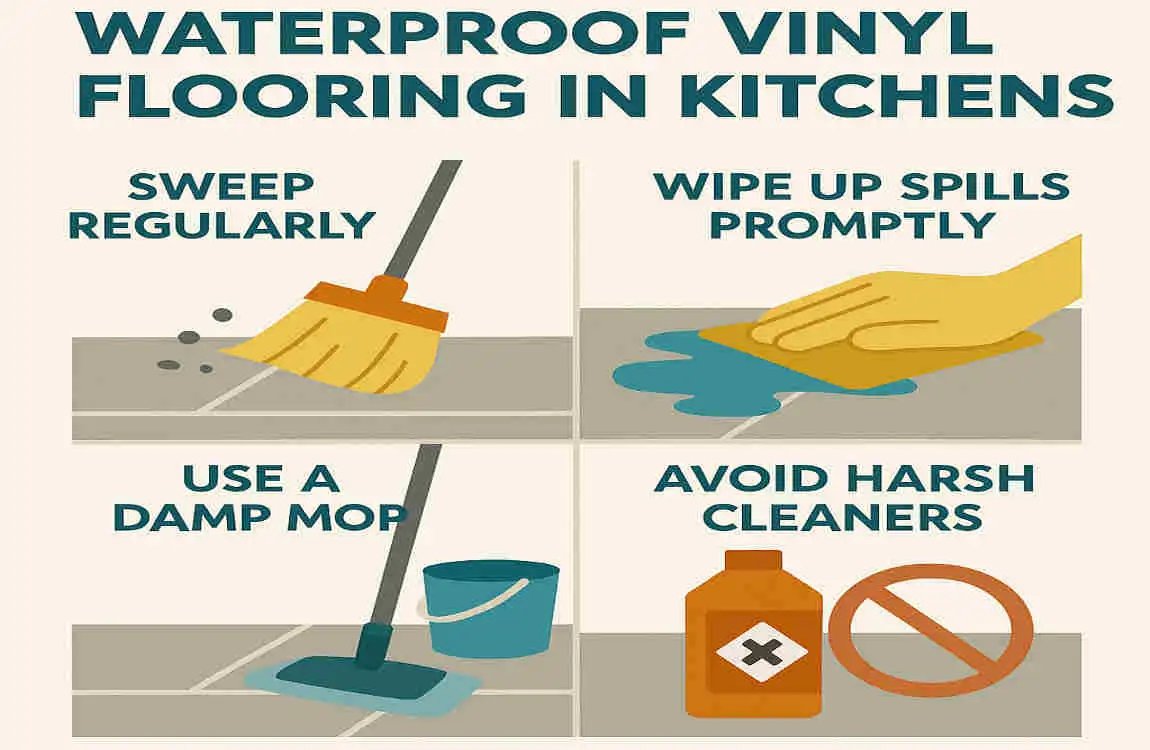
One of the most significant advantages of waterproof vinyl flooring is its low-maintenance nature. Here’s how to keep it looking its best:
Routine Cleaning
- Sweep or vacuum regularly to remove dirt and debris.
- Use a damp mop with a mild cleaner for deeper cleaning.
Spill Management
- Wipe up spills immediately to prevent stains or sticky residue.
- For tougher messes, use a vinyl-safe cleaner.
Preventing Damage
- Use furniture pads to avoid scratches.
- Place rugs or mats in high-traffic areas for added protection.
Stylish Vinyl Flooring Trends for Modern Kitchens in 2025
Design trends in 2025 are all about combining functionality with aesthetics. Here are some popular vinyl flooring trends to consider for your kitchen:
Wide Plank Designs
Wide planks create a sleek, modern look while showcasing the natural beauty of wood or stone patterns.
Realistic Textures
Embossed textures add depth and realism, making vinyl flooring almost indistinguishable from natural materials.
Bold Colors and Patterns
From deep navy tones to geometric patterns, bold designs are making a comeback in kitchen flooring.
Cost Considerations and Value for Money
Vinyl flooring is not only affordable upfront but also offers long-term savings due to its durability and low maintenance. Here’s a breakdown of cost considerations:
- Price Ranges: Expect to pay $2–$7 per square foot for quality waterproof vinyl.
- Installation Costs: DIY installations can save you money, but professional installation typically ranges from $2–$4 per square foot.
- Lifespan and Savings: With proper care, waterproof vinyl flooring can last 15–20 years, offering excellent value for money compared to hardwood or laminate.

